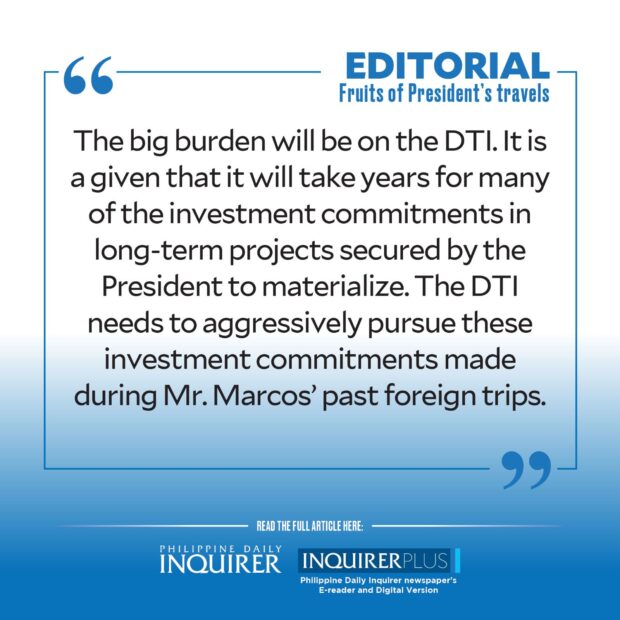Fruits of President’s travels

President Marcos returned home on Saturday after working visits to Germany and the Czech Republic, his 24th foreign trip, and the 16th and 17th countries he had visited since he assumed office in 2022. Critics, as they did during the frequent foreign travels especially of then President Fidel V. Ramos and Mr. Marcos’ predecessor, Rodrigo Duterte, lambasted the trips as a waste of precious taxpayer money. Duterte himself charged that the President was just out for leisure (“pasyal”) in his foreign trips.
“This is my schedule. Where’s the time for leisure? Where’s the ‘pasyal’? None,” Marcos said in response, showing the press a copy of his schedule. Also in defense, Trade Secretary Alfredo Pascual highlighted the gains of the President’s latest trip, noting that the investments the Philippine delegation got showed the trust of German businesses in the country. “These agreements only signify the confidence that German businesses placed in the Philippines [and] also underscore the alignment of our economic priorities,” Pascual noted. According to the Department of Trade and Industry (DTI), the total investment commitments made during the Germany visit amounted to $4 billion (about P220 billion) in key sectors such as health care, manufacturing, innovation, agriculture, and renewable energy.
Investment numbers
The investment numbers from Mr. Marcos’ previous travels are likewise worth noting. In December last year, Malacañang gave a financial tally of the gains of the President’s globetrotting: $72.18 billion (about P4.02 trillion) worth of investments from his 19 foreign trips since assuming office to the end of 2023. Citing data from the DTI, it said the figure represented the consolidated and processed investments covering 148 projects. Of this number, the more relevant are the actual investment commitments made during the foreign travels that actually materialized. The DTI noted that $5.08 billion (P282.8 billion) worth of investments were in projects already being registered with the different investment promotion agencies; $983.2 million (P54.75 billion) in ventures already registered with IPAs, and $205.5 million (P11.4 billion) in additional investments in existing IPA-registered projects. The DTI added that there were also signed agreements with clear financial project value amounting to $9.77 billion (P544.15 billion).
Article continues after this advertisementLiberalization of economic policies
Aside from these investments, it is worth citing that the President has actually achieved other important gains for the country in his foreign travels. Topping the list is the warming up of ties between the Philippines and the United States, the country’s oldest ally, which was severely strained after Duterte’s pivot to China and now seems to have very little to show for it. Just look at the frequent harassment of Filipino vessels and fishermen in the West Philippine Sea, or the scuttled billions of dollars in Chinese loans earmarked for much-needed infrastructure projects such as railways. With his Germany trip, the President has also started restoring the country’s relations with the European Union that was impaired by Duterte’s bloody war on drugs marred by alleged human rights violations.
Mr. Marcos’ economic diplomacy is showing to the world that the Philippines is worthy of foreign investors. In his foreign trips, the President often cited the liberalization of economic policies, especially the opening of key sectors such as renewable energy, transportation, and telecommunications to foreigners. As the President told investors during the 10th Asian Summit in Singapore in September last year, the Philippines is now a prime investment destination and a nation on the rise, “ready to collaborate with partners who see the potential that we hold in the Philippines.”
Improved overall economy
However, there are important tasks at hand to push this forward. For one, the government must address the real issues of why foreign investors are shying out of the country—slow connectivity, poor infrastructure, unstable policies, and corruption. The Anti-Red Tape Authority likewise needs to speed up work on improving the tedious process that investors—both foreign and local—go through, and for the government to computerize the Bureau of Customs and seal entry points of contraband goods to curb smuggling that investors often complain about.
Article continues after this advertisementThe big burden will be on the DTI. It is a given that it will take years for many of the investment commitments in long-term projects secured by the President to materialize. The DTI needs to aggressively pursue these investment commitments made during Mr. Marcos’ past foreign trips. The bulk of the number cited by Malacañang during the end-2023 assessment amounting to $28.53 billion, or P1.59 trillion, represented projects that were either only signed or still in the planning stage. Only when these investment promises are translated to actual projects will the Filipinos benefit in terms of job opportunities and an improved overall economy whose gains will hopefully trickle down to the marginalized sectors.
















